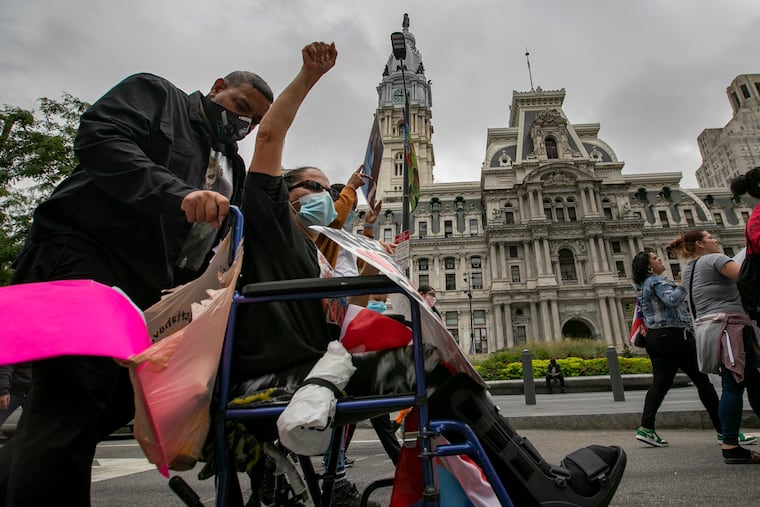A month after her son died in Philadelphia jail, a mother is still fighting to learn why
"My son was assaulted," Eva Diaz said. "He was found without a pulse." If true, it would be the first homicide at the Philadelphia jails in about five years.

On Thursday morning, Frankie Diaz Jr. was scheduled to have his day in court, a repeatedly delayed trial for a 2019 drug-dealing charge.
Instead, his mother, Eva, and a dozen family members and friends were gathered outside the Stout Center for Criminal Justice, demanding answers about Frankie’s death in city custody in August.
“They don’t give me no answers,” Eva Diaz said. “My son was found supposedly unresponsive in the shower of the dorm that he was in. I know my son was assaulted. I know my son was found without a pulse.”
Diaz said she got that information from his medical records and other prisoners. If true, it would be the first homicide at the Philadelphia jails in about five years.
The medical examiner and the Department of Prisons say the death is under investigation and no information can be released. Diaz wants to know what happened, who is responsible, how long it took corrections officers to discover Frankie on the ground, and whether anyone will be held accountable.
So, she and her family have been protesting — holding lonely roadside vigils as cars whoosh past on a highway, like State Road by the prison complex, and on Thursday chanting “Say his name” outside the courthouse, the starting point of a march to the offices of the district attorney and the managing director.
Frankie, who was 30, worked in demolition and was engaged to Betsaida Powell, who described him as gentle, kind, and generous. “He was the nice one, and I was the spice one,” she said.
He also had a history of drug convictions and grappled with addiction to heroin, according to his younger brother Josh. He was arrested Dec. 31, 2019, and spent eight months in jail, contracting COVID-19 there, according to his family. A probation detainer (his arrest put him in violation) prevented him from posting bail.
But his family does not believe he was dealing drugs at the time of his arrest, and said the charges reflected only the routine over-policing of their impoverished corner of North Philadelphia. “We live in this neighborhood where ... if you walk around, forget about it, you get shot or the cops can arrest you,” Eva said.
On Aug. 18, they got the call that Frankie had been taken to Aria-Jefferson Health Torresdale.
Josh said he raced to Torresdale and was told Frankie had died of a brain aneurysm. He said he demanded to see his brother, and what he saw told a different story, he said: a broken nose, a swollen black eye, and lacerations on his lips.
“I seen my brother’s face. My brother did not pass away of a brain aneurysm. He was brutally murdered," he said.
He, and his siblings, ages 14 to 35, have joined their parents in the weekly protests, taking days off work from jobs as hospital workers, home health aides, and rideshare drivers to make signs and pass around a microphone, handing flyers to passersby.
They’ve been piecing together information that’s trickled out from the inside: that there was only one camera in the dorm, that there were two corrections officers on the whole cell block, that Frankie was not found until the prison conducted its lunchtime headcount.
The family believes the Detention Center, the jail where Frankie died, was short-staffed at the time of his death. They wonder if his death is what triggered administrators to empty the Detention Center, the city’s oldest functioning jail, in late August.
A spokesperson for the corrections officers’ union, AFSCME District Council 33, Local 159, did not respond to questions for this story but previously described a staffing crisis at the jails, such that workers were “being held hostage” at the end of their shifts and forced to work overtime to cover the shortfall. Reports related to a federal lawsuit over jail conditions during the pandemic also document staffing shortages this summer.
Carlos Rivera, Frankie’s oldest brother, said it’s hard to understand how it could take a month to investigate a death that occurred in such a confined space. For now, he said, the lack of certainty has put his family in danger.
“At this point, we don’t know what’s going on, or if we got to live in fear from someone in there calling someone out here to come for us. We’re not getting any information. We don’t know if there’s a gang member. And we can’t just live not knowing who did this.”
Eva Diaz said right now only one thing is certain: “I’m not going to stop until I get justice for my son.”